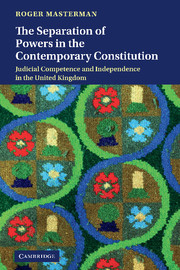 The Separation of Powers in the Contemporary Constitution
The Separation of Powers in the Contemporary Constitution Book contents
- Frontmatter
- Contents
- Acknowledgements
- Table of cases
- Introduction
- PART I Separation of powers, the Human Rights Act and the European Convention on Human Rights
- PART II Judicial engagement with the ‘political’ branches
- 4 Justiciability
- 5 Deference and proportionality
- PART III The creative powers of courts
- PART IV The separation of the judicial branch
- Select bibliography
- Index
5 - Deference and proportionality
from PART II - Judicial engagement with the ‘political’ branches
Published online by Cambridge University Press: 10 January 2011
- Frontmatter
- Contents
- Acknowledgements
- Table of cases
- Introduction
- PART I Separation of powers, the Human Rights Act and the European Convention on Human Rights
- PART II Judicial engagement with the ‘political’ branches
- 4 Justiciability
- 5 Deference and proportionality
- PART III The creative powers of courts
- PART IV The separation of the judicial branch
- Select bibliography
- Index
Summary
Introduction
By bringing questions arising in connection with the Convention rights clearly into the jurisdiction of the courts, the HRA has considerably altered the division of governmental power in the constitution. But it is not simply the judicial determination of questions of human rights simpliciter that has fuelled calls that the judicial branch has been empowered at the expense of the elected branches. It has already been noted that the circumstances in which disputes over rights arise frequently call for courts to consider and adjudicate over competing ‘goods’ which are said to be more appropriately considered in political fora. While the judicial review jurisdiction has long held to the notion that review of administrative action should not amount to review of the merits of a given decision, it has been argued that – in asking that the courts review instances where individual rights should be proportionately balanced against the public interest – courts are brought into much closer relief with the merits of individual governmental decisions. It is therefore the legal tests associated with rights adjudication that have provoked objection from rights sceptics, as much as adjudication over human rights themselves.
This chapter examines the related issues of deference and proportionality. Deference allows a variable degree of weight to attach to the decisions of public bodies, and to the justifications put forward by those bodies in defence of a particular policy or course of action.
- Type
- Chapter
- Information
- The Separation of Powers in the Contemporary ConstitutionJudicial Competence and Independence in the United Kingdom, pp. 115 - 142Publisher: Cambridge University PressPrint publication year: 2010


